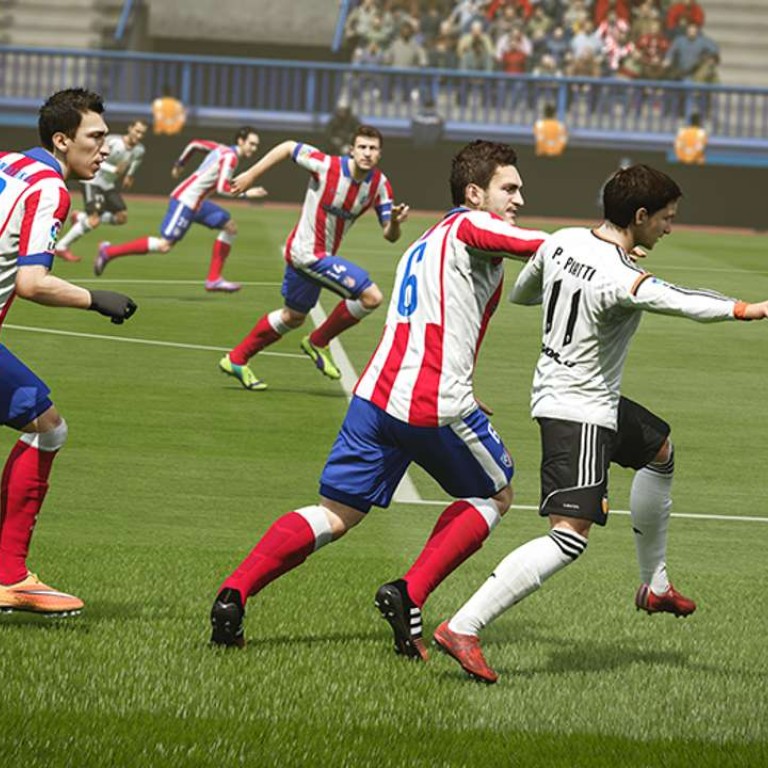
Fifa 2016 could be the video game that saved the beautiful game
The latest in EA Sports’ long-running football series may rebuild the shattered reputation of its real-world counterpart
France faced a one-goal deficit against Brazil with two minutes of stoppage time left, and its manager ordered a full offensive. Christophe Jallet tapped a pass to Antoine Griezmann, and Griezmann gave it one touch before firing top left for the equaliser – and, in this two-game final, the tournament winner.
Hundreds in the crowd erupted in shock. Griezmann took off for the corner of the field, diving head first just in front of the flag and waiting for teammates to pile on top. And three metres below the screen where Griezmann had scored, Mohamad Al-Bacha ran in circles, jumped and screamed.
Moments later, he stage-dived into a pack of supporters – his first act as a world champion, before accepting his oversized US$20,000 cheque and free trip to the Fifa Ballon d’Or presentation.
“To win the competition is beyond words for me,” the 19-year-old from Denmark says.
Last week, the 32 top Fifa 16 video game players from around the world gathered in New York for the Fifa Interactive World Cup. The pitch was digital, but the stage was very real, with the four semi-finalists settling things at the historic Apollo Theatre in front hundreds of fans.
The competition was broadcast live on Fox Sports 1 and streamed in more than 100 countries online, and Al-Bacha’s crown was earned from a season in which millions of Fifa games were played.

Investigations by American and Swiss prosecutors have revealed wide-ranging corruption throughout the organisation, and over the past nine months, the names most associated with Fifa haven’t been star players such as Lionel Messi or Cristiano Ronaldo. Instead, headlines have been filled by Blatter, former vice president Jack Warner and Uefa president Michel Platini.
All of that seemed insignificant to fans and competitors at the Apollo, and given the success of EA Sports’ Fifa game franchise, that’s not surprising.
Aspiring players – many teenagers – packed the theatre. Some hope to become the next Messi or Ronaldo, but they also see a path to becoming the next Al-Bacha. Here, the embattled Fifa organisation sees an opportunity to change the conversation around soccer’s governing body.
“I remember when I started in 2007 at Fifa,” Fifa marketing director Thierry Weil says. “I googled the brand Fifa. The first two pages was all the Fifa game.”
The game gives the federation a second identity, one that’s already very profitable and critical for its image at a time when Fifa’s dirty laundry risks turning off potential fans. “It’s a great tool, to be honest,” Weil says. “When you talk to kids, it’s, ‘Oh yeah, Fifa. Fifa is great’.”
The game was the top seller across all genres in Europe last year and is also popular in North and South America.
With competitive e-sports emerging on an international level, Fifa sees an opportunity to leverage its licensed EA Sports title into a better reputation with young fans, such as John Vizhnay, 19, who came to the final to get a glimpse at the world’s best players – a big jump from the games he plays at home against friends.
“We make our own small tournaments and stuff,” Vizhnay says, adding that “yeah, maybe I would like to be here one day.”
EA Sports has three of the most popular games globally in its Fifa, Madden and NHL franchises. Those titles each have digital global arenas in which players can construct their own rosters and challenge peers, and if they choose, gamers can pay extra to acquire better players and other upgrades to get a leg up. Those in-game purchases provide extra revenue streams, and, according to EA Sports most recent quarterly report, “have kept many of our players engaged with those games for longer periods of time”.
The final 32 players represented a dozen countries in the 12th Interactive World Cup, and Fifa sees room for expansion. Weil flew in for the final straight from China, and the following day had a meeting planned with EA Sports to discuss how the Fifa game franchise could expand its footprint to Asia.
The biggest obstacle will be rewriting Fifa to be played on PCs – Asian gamers use fewer consoles than players in Europe and the Americas. The shift is already under way, though, with EA Sports reporting a 24 per cent boost in extra content sales driven mostly by Fifa in China during the last financial quarter.
The goal, eventually, is to get these gaming superstars into their own Champions League, with household names on the pitch being controlled by household names on the sticks.
“Sooner or later, they will become stars like Ronaldo or Messi,” Weil says. “In their community, they know already the names. They know each other, they follow each other, they see, they compete with each other on a regular basis, and I know when you talk about certain names in the e-sports, they are stars already.”
The Fifa brand might be struggling, but on stages such as the Apollo – with sponsor logos slapped on every available space – it’s clear the federation has at least one enormous advantage to leverage. “It’s a huge achievement for us,” Weil says, adding that “this today is a whole other level which will take off.”
Associated Press

